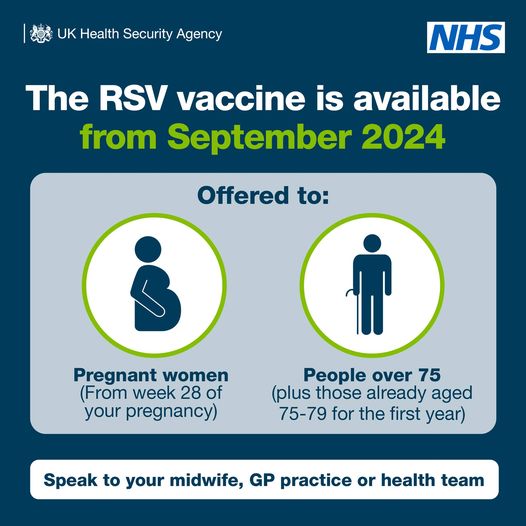Your guide to the RSV vaccine for older adults

From 1 September 2024, those who turn 75 and those age 75 to 79 will be eligible for a free vaccine to protect them from respiratory syncytial virus (RSV).
RSV is an infectious disease of the airways and lungs. RSV infection often causes symptoms similar to a cold, including:
cough
sore throat
sneezing
a runny or blocked nose
It can also make you become wheezy or short of breath and lead to pneumonia and other life-threatening conditions. There is no specific treatment, and most infections will get better by themselves. Every year thousands of older adults need hospital care for RSV, and some of them will die. RSV can be more severe in people with medical conditions such as heart or lung disease or a weakened immune system.
RSV infection is common in young children but is most serious for small babies and for older people.
How RSV is spread
RSV infections can occur all year round but cases peak every winter.
RSV can spread through coughs and sneezes. You can help to prevent the spread of the virus by covering your mouth and nose when you cough or sneeze (ideally with a tissue, or else into the bend of your elbow), and you can wash your hands frequently to reduce the risk of picking up the virus. Even with these measures it can be difficult to avoid RSV infection.
The best way to protect yourself is to have the vaccine.
How the RSV vaccine works
Almost all older adults will have had several RSV infections during their life. A single dose of vaccine will help to boost protection as you reach an age group at highest risk of serious RSV infection. Unlike the flu vaccine you do not need to have the RSV vaccine every year.
Eligibility for the RSV vaccination
Everyone turning 75 years old on or after the 1 September 2024 will be offered a single dose of RSV vaccine. This is because older adults are more at risk of serious complications from RSV. You can still get the vaccine up to the day before you turn 80.
For the first year of the programme, the vaccine will also be offered to those who are already aged 75 to 79 years on 1 September 2024 as part of a catch up programme.
If you are not yet 75 the NHS will invite you for vaccination once you turn 75.
Having the RSV vaccine at the same time as other vaccines
Shingles and pneumococcal vaccines
You may be offered your shingles or pneumococcal vaccine at the same time as the RSV vaccine, it is safe to do so and reduces the number of appointments you will need to get protected from these diseases.
Flu and COVID-19 vaccines
RSV isn’t normally arranged to be given at the same appointment as your COVID-19 or flu vaccines.
In certain clinical circumstances, your doctor or nurse can safely offer them at the same time.
Those who should not have the RSV vaccine
Almost everybody can have the vaccine, but tell the doctor or nurse if you have ever had a serious allergy to a vaccine, or any of the ingredients.
You can read the patient information leaflet for the RSV vaccine called Abrysvo.
If you have a minor illness such as a cold you can receive the vaccine, but if you are very unwell or have a fever, the doctor or nurse may advise you to wait until you are better.